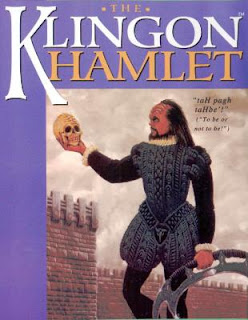Act III, scene i: Macbeth's New Castle, at Forres (atop Dunsinane Hill)
Banquo is deeply suspicious of his best friend, who is now King of Scotland, and he references the Weird Sisters in a brief soliloquy beginning this scene. When Macbeth comes out, wearing the crown and speaking of himself in the Royal We (which isn't annoying at all, btw) Banquo is surprisingly deferential to him. Macbeth refers to the sons of Duncan as "our bloody cousins" and reveals that he knows exactly where they are--thus indicating to a perceptive reader that he has spies everywhere. This is not a monarch who rests easily upon his throne; he knows to what ends he has gone to ascend to power, and he is going to ensure that nothing dethrones him.
Over the course of his speech, Macbeth weaves three questions to his best friend, attempting to be subtle. Unfortunately for the clueless Banquo, the questions work. Ride you this afternoon? Is't far you ride? Goes Fleance with you? These questions sound benign, but let the AP Lit Translation Service recast them: Are you leaving the palace unguarded this afternoon? Are you going far away, where no one can hear you scream? Oh, and are you taking your spawn with you? In other words, Banquo is doomed. Macbeth tells him that dinner is at seven, and urges him to "fail not our feast." Then, he dismisses everyone, and talks to himself--still in the Royal We. Someone is having an identity crisis.
Let's think for just a moment about the character development here, or, rather, the devolution. Macbeth had to be goaded into committing the first murder, then freaked out with apparitions, guilt, and incompetence in the moments leading up to, including, and immediately following the death of Duncan. Once he acquires a taste for off-battlefield blood, though, Lady Macbeth's "creation" has grown feet of his own, and he slaughters the two guards with nary a guilty thought. Now, he is clearly plotting the murder of his best friend, and his best friend's child. The moral slippery slope upon which Macbeth is balanced is titled so precariously that he no longer needs Lady Macbeth to guide his murderous hand. The interpolation of the characters has begun, most tellingly in that he doesn't disclose his new plans to his former "dearest partner of greatness." She needs to watch her back.
Macbeth wants Banquo gone for two reasons--one, because "our fears. . .stick deep" (he suspects, rightly, that Banquo isn't falling for the whole "Duncan died at our house but we had nothing to do with it" routine) and two, because the witches predicted that Fleance would inherit the throne. He laments, using particularly choice language of "barren" and "unlineal" imagery, that everything he has done to the "gracious Duncan" has been for someone else. Not only is Macbeth ambitious beyond comprehension for the present tense--his greed now extends to the next generation, a generation he won't even be around to witness! What a tool.
A servant brings in two murderers, and over the course of their conversation Macbeth repeatedly insults them, comparing them to dogs (mutts, specifically) and telling them that all of the things they had once thought Macbeth had done to them, Banquo actually had. He has planted a seed of hatred in these cutthroats, and as an afterthought, he asks them to kill the child as well. We know, however, that Fleance is his chief objective. Even in the rough Dark Ages of Scotland, women and children were a separate category--sell them into servitude, sure, but kill them? Not so chivalrous, even in these rough ages. Macbeth is beyond redemption, or so it would seem.
Act III, scene ii: Still inside the castle--a sequence of domestic "bliss"
Lady Macbeth asks a servant to convey her wish to speak to her husband; something that the B.A. Lady Mac of Act I would never, ever have done. Ask permission to speak to the man she ostensibly shaped into being? Unbelievable. Well, Mac has learned to ride the bicycle without training wheels now, and he no longer needs her. He does go to her, however, and they have a weird conversation in which he uses snake imagery to relate his despair over not having all he has ever wanted. She seems content to be Queen, but when she questions his motives and his future plans, he tells her to be innocent of the knowledge until it has already happened. And he calls her his "little bird," which would have been fighting words two acts ago. Their marriage is definitely in a different zone now, and not for the better (from her perspective.) She has to know on some level that his murderous urges are not yet sated, but since she has been relegated to the role of "typical woman" she has no power over him at this point.
Act III, scene iii: Outside of the castle, in the woods.
This brief, but shocking, scene is the first on-stage murder in the play, and serves as the turning point. Up until this moment, Banquo has been a moral light amid the darkness of the unfolding events, a flash of hope that perhaps Macbeth might come to his senses and repent. No more. Weirdly, three murderers show up to do the job instead of two--and much has been said of this discrepancy over the ensuing years, with theories ranging from the interference of the witches themselves to uphold their prophecies to a mistake in the text to Lady Macbeth serving a role to Macbeth himself. Regardless, the three mess everything up; Banquo fights valiantly to save his son, and Fleance flees (nice alliteration!) into the forest. The murderers, abashed at their own suckiness, have to go tell Macbeth about their error. Banquo is dead, with twenty stab wounds to his skull, but the little kid darted, weaved, and escaped. I do not think it coincidental with all of the bird imagery in this play that Banquo demands that his child "fly" to freedom.
Act III, scene iv: Macbeth's first official state dinner, at which he loses his royal marbles.
Lady Macbeth, ever the gracious hostess, seats all of the thanes who have attended Macbeth's first dinner party, but noticeably MacDuff is not present. This is the second major event he has declined to attend, and he will pay dearly. Pleasantries are exchanged and Banquo's absence is verbally noted by Macbeth in a duplicitous manner, until one of the murderers--with blood on his face, which is super-tacky for a formal dinner party, not to mention the whole Let's Be Subtle About Killing the Dude thing--shows up and demands Macbeth's attention. Macbeth goes to the side, and discovers that Fleance has 'scaped, which makes him really, really mad. You just can't get good help these days, he thinks, and as he returns to the dinner table, he realizes that all of the seats are full. Why? Because the ghost of Banquo has manifested itself and is sitting in his seat, pointedly, looking really disgruntled at the whole Why Did You Kill Me thing.
Macbeth freaks out.
Lady Macbeth tries to control her husband in the only way she knows how, by emasculating him. "Are you a man" she hisses, and he replies incoherently with something about bears and tigers and how awesomely mighty he is. This is one great king.
The ghost leaves. Lady Macbeth tells the guests that Macbeth is always like this, so they should just relax. As far as excuses go, this is pretty poor. "Oh, don't worry. Your king is a lunatic and has been since childhood. It's all good!"
Etiquette being what it is, though, the guests gingerly sit back down and probably don't eat much. What a horrible dinner party. (There was this wonderful TV show on in the early 1970s called The Mary Tyler Moore Show, in which Mary Richards, the main character, repeatedly tried to throw dinner parties that were just awful. No one had fun, everyone felt awkward, people left early. The writers must have had this scene in mind when they created that ongoing subplot.) Just when the tension is reaching a fever pitch, the ghost does another turn around the room, and Macbeth completely loses it. Flailing about irrationally, he looks positively regal as he terrifies his constituents and breaks up the party. Once the thanes are gone--probably racing home to post status updates on the medieval version of Facebook--Lady Macbeth tries to talk to her husband.
He tells her that he has spies in the MacDuff household, and that he is going to talk to the witches again, and that darkness is taking over his soul.
She tells him he needs a nap.
Honestly, what else can she do? His train has sailed.
Act III, scene v: A heath again, for the scene probably not written by Shakespeare. Check out the bizarre rhyme scheme.
Hecate and the witches hang out, dance, and taunt each other. The only valuable thing in this scene is the line in which Hecate rebukes the witches for investing so heavily in a "wayward son" who won't benefit them at all.
Act III, scene vi: Forres, the palace.
In this primarily expository scene, Lennox and another random Lord talk about what's going on. Not much is revealed, except:
*People think Macbeth is a jerk;
*Malcolm has been given safe harbor by the King of England;
*MacDuff has fled to England to join forces with Malcolm;
*Things are really, really crappy in Scotland.
One cannot rule by brute force alone; Macbeth has no more actual supporters. The tide has turned.







